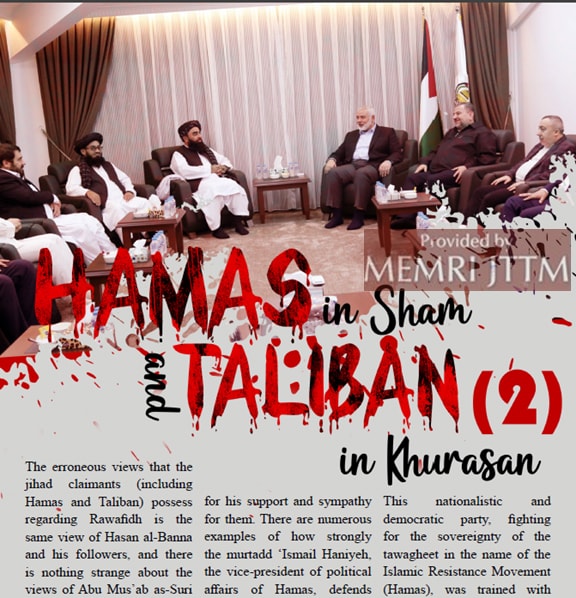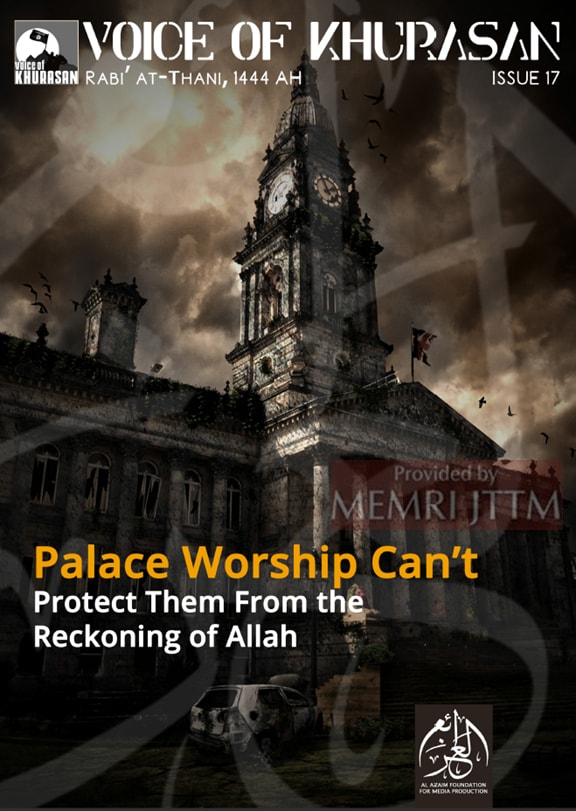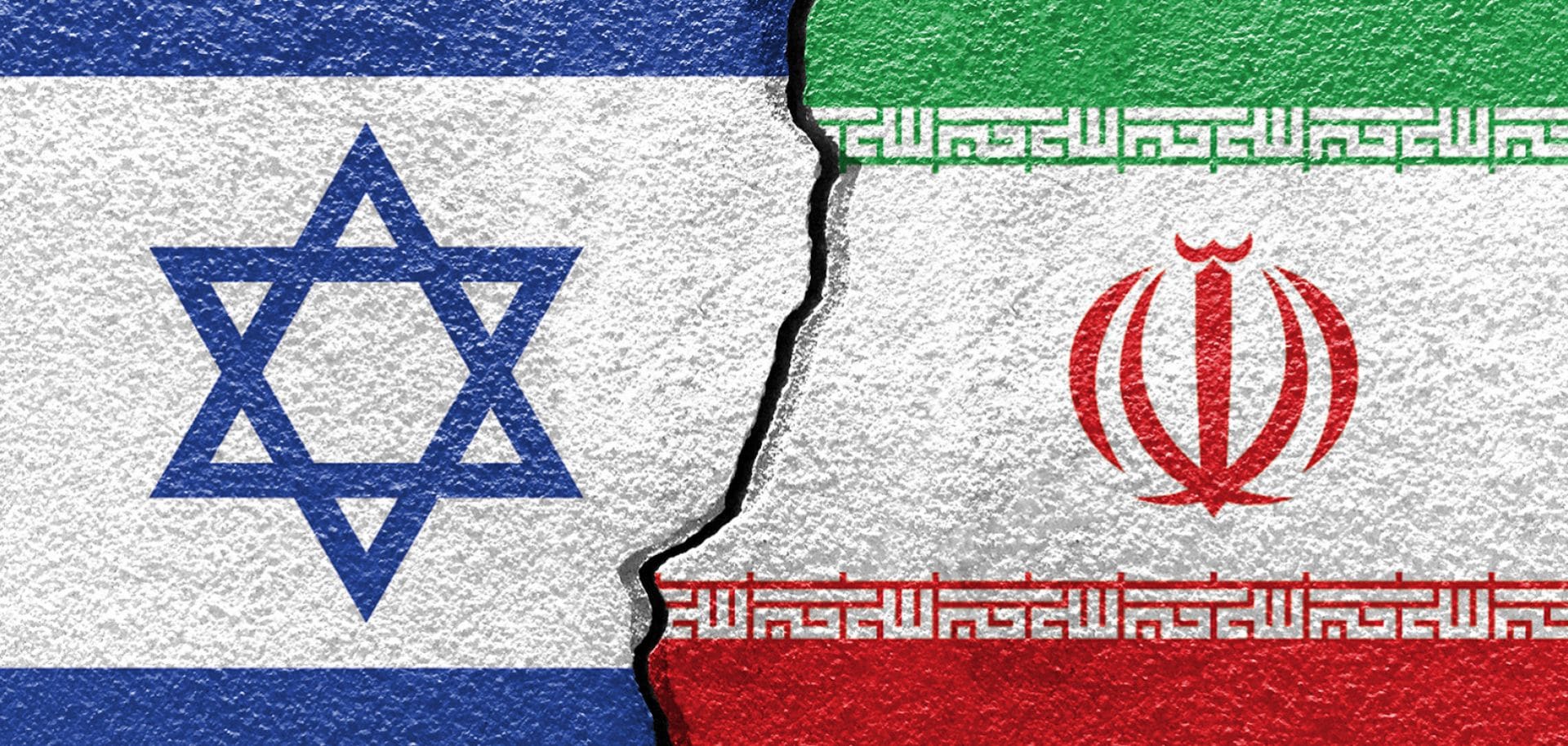The following report is now a complimentary offering from MEMRI's Jihad and Terrorism Threat Monitor (JTTM). For JTTM subscription information, click here.
The latest issue of "Voice of Khurasan," an English-language monthly magazine published by Al-Azaim Foundation, the media arm of the Islamic State's Khurasan Province (ISIS-K), eulogizes the slain Indian jihadi fighter Abu Khalid al-Hindi, condemns Egyptian Islamic scholar Yusuf Al-Qaradawi for digressing from shari'a and for supporting the regimes in Qatar and Turkey, and is sharply critical of Hamas, the Afghan Taliban, and the Muslim Brotherhood, all of whom, the magazine declares, are working for Iran and the U.S.
The Issue 17 of the magazine is dated Rabius Saani 1444 , in the Hijri calendar, which corresponds with the lunar month beginning on October 26, 2022.[1] The magazine includes several articles promoting a jihadi view of current events along with discussions of religious issues.

The magazine's lead article is titled "Palace Worship Can't Protect Them From the Reckoning of Allah." It criticizes Yusuf Al-Qaradawi, the recently deceased Egyptian Islamic scholar who was based in Qatar.
"The wicked influence of al-Qaradawi has made the Taliban [in Afghanistan] lose their mind to the point that ‒ after abandoning the jihad fi sabilillah [jihad in the path of Allah] to become protégée of the Qatari-Turkish Taghut [tyrant regime] and sign an un-Islamic agreement with the Taghut U.S. ‒ they ended up courting even the global Taghut to be granted the membership of the so-called United Nations," it says.
"Given the magnitude of the threats to Islam in the modern dunya [world], martyrs Sayyid Qutb and Abdallah Al-Azzam were adamant in calling the Ummah to 'hold firmly to the rope of Allah,'" the article says.
It goes on to comment that "Opposite to Qutb and al- Azzam, al-Qaradawi's efforts as an alim [scholar] were not aimed at serving the cause of Allah, but the quest for power of his human providers, namely the Taghut of the [ruling royal] at-Thani's house in Qatar, together with the personal ambitions of his nafs [self, ego]: a most serious act of shirk [idolatry] which prompted al-Qaradawi to take a different course from what the Koran and the Sunnah [traditions of Muhammad] clearly indicate as the way forward for Muslims to deal with the kuffar [unbelievers] and the mushrikeen [polytheists]."
The article accuses Qaradawi of endorsing democracy, which the magazine declares to be a bid'a ("innovation") and not permitted by shari'a. "Denying the teachings of Prophet Muhammad as a strategist and commander, Al-Qaradawi disposed of both the Book and the sword, and made his followers believe that the solution for the truth to prevail lies in democracy. It goes without saying that this is a blatant bid'a, since Allah is the sole Legislator, and Muslims cannot accept or compromise with the idea of man who holds 'sovereignty' (haram)," the article states, given that in Islam, all sovereignty belongs to Allah.
In recent months, the Voice of Khurasan has been publishing a series of articles titled "Memories of Shuhada [Martyrs]" which pay tribute to slain ISIS fighters. The magazine's latest edition has another article in this series, paying tribute to a jihadi fighter from the Indian state of Kerala known under a pseudonym of Abu Khalid al-Hindi. "Being born in the city of Kerala in South India, this young man had feelings of malice and immense hatred towards polytheists, the enemies of Allah, from the childhood. And especially when he saw the polytheists of India oppressing the Muslims of India, especially in the occupied Kashmir, he would be very angry," the magazine says.
Although the article does not reveal specifics about Abu Khalid al-Hindi's real identity, the article reveals that he had lived for some time in Dubai and Malaysia and had traveled to Saudi Arabia possibly to perform the Hajj pilgrimage. Subsequently, he sought help from jihadi circles and landed in Khurasan (Afghanistan). "He was looking for a way to migrate to Iraq and Sham [Syria], but he could not find a way. So, he contacted the brothers who had migrated to Khurasan Wilayah earlier, and they guided him in passing through the outposts of kuffar and murtadeen [apostates], and workshops of the Devils," says the article.
After reaching Afghanistan, Abu Khalid Al-Hindi "received combat training from Mu'askar in the areas of Wazir and Torah Borah, from where mujahideen marched forth in form of an army to thwart the advancement of the murtad [apostate] forces." He carried out an attack at a gurudwara, a Sikh temple in Kabul.

"Abu Khalid Al-Hindi entered the place of worship of the Sikh pagans and opened fire on them, and the murtads Afghan army, which was appointed for ensuring peace and security for shirk and its people in Afghanistan, engaged in a deadly clashes with him, and he detonated two mines on them, sending a number of them to Hellfire and injuring many others. As a result of this blessed operation, around 60 members were killed and injured in the ranks of the murtadeen and the kuffar," the article notes.
In an article titled "French Colonization In Africa And Their Barbarism On Muslims," ISIS-K accuses France of pursuing a policy of "barbarism and deep-rooted hatred for Islam and its people" in its former colonies such as Algeria, abandoning its stated policy of Laicite ("state secularism") in Africa in favor of assimilation.
"The French came with one specific mission: to 'civilize' its colonies by absorbing them administratively and culturally. Its ambition was to lift up North Africa to the French standards by bringing Christianity and French culture and wipe out Islam," the article says.
It notes that the French policy of "assimilation" was a failure because it emanated from "the belief in the superiority of French civilization over the 'inferior' African one." The article goes on to add: "To French officials, Islam was the biggest obstacle, a 'belligerent religion' that needed to be quelled and controlled. A civilizing mission was launched to justify France's imperialist expansion."
The article accuses the French of wiping out "the entire tribe of the Ouffias" and killing more than a million Muslims in Algeria. "The immediate goals of the invasion were to 'end piracy and reclaim Algeria for Christianity.' In line with France's Christian commitments, the conquering French army took over mosques and converted them into churches and cathedrals at gunpoint," affirms the jihadi publication.
The magazine's other lead article accuses Hamas, the Muslim Brotherhood, and the Afghan Taliban of double standards and questions their silence on major global Islamic issues such as China's persecution of Uyghur Muslims in Xinjiang province. The article, titled "Hamas In Sham [Syria] And Taliban In Khurasan (2)," is the second in a series.

The first part, "Hamas In Sham [Syria] And Taliban In Khurasan," had appeared in Issue 16 of Voice of Khurasan and was focused on criticizing the Egyptian Muslim Brotherhood, accusing it of befriending Rafidha ("rejectionist," a pejorative term for Shi'ites) leaders such as Imam Khomeini. It declared Muslim Brotherhood an apostate organization.
the article notes: "This murtad group appeared in most of the so-called Islamic countries and even in the western countries. It also spread to Europe, Australia, and America, especially in the Muslim communities"; "The main goal of the Brotherhood is that... all madhabs and their followers shall gather under the same thought and belief in the name of Islam – a belief that will be conflicting with the true Islam."[2]
The second part of the magazine's current issue focuses on the Hamas, comparing it to the Afghan Taliban and explaining in detail how both jihadi organizations have digressed from Islamic shari'a in their ambition to gain territorial power driven by nationalism (identities based on geography, in this case, Palestine and Afghanistan) instead of pursuing the interests of Islamic Ummah, the single global Muslim community.
"What is the reason that Palestine is considered to be the only land of Islam?" – the magazine asks. The article accuses global jihadi movements of inculcating in the minds of common Muslims the notion that other issues, such as the persecution of Uyghur Muslims by China in Xinjiang province, are not Muslim issues.

"[T]he Muslims living in peaceful environment have no idea about their Muslim brothers and sisters outside Palestine. This is the hypocrisy of the infidels who simply use the Palestine issue as a sleeping pill for the Muslims for taking their attention away from the actual problems of the Ummah. And they are using Hamas, the Taliban, and leaders of the so-called Muslim countries as puppets for this heinous purpose," it states.
In its literature, ISIS-K has frequently declared the Afghan Taliban to be an apostate force out of the fold of Islam for engaging with the unbelievers like the U.S. in order to gain power through the U.S.-Taliban agreement signed in Doha in 2020. "Hamas is also making use of all possible means to take over Palestine, whether it is through democratic elections, Iranian idolaters [Shi'ites], or any kind of interaction with other kuffar and mushrikeen. Their ultimate objective is to gain power of Palestine and that's it. They don't really care about making the word of Allah higher," it says.
The article accuses Hamas of receiving Iranian support. "[The] purpose of Iran's support... [is to gain] Iranian influence in the Arabian Peninsula, as Iran wants to expand its sphere of influence on its soil by eliminating its rivals and spreading its heretical ideology, beliefs, and cultures. In short, Iran is again dreaming of the ancient Persian Empire and using murtad factions like Hamas and the Taliban to fulfill that through the promotion of Rafidha creed," the magazine publication affirms.
The lead article further observes: "The occupation of Jews [in Palestine] is considered to be only occupation? The Jews' atrocity in Palestine is highlighted by the jihad claimants of the time, but if the same Jews and Crusaders indiscriminately bombard areas under the control of the Islamic Khilafah, such as Mosul, Raqqah, Baghouz, Sinai, West Africa, Khurasan, and other lands of Muslims, then these jihad claimants, chanting empty slogans for the freedom of Palestine, express their happiness over it.

"If the Jews and the Crusaders bombard mosques and martyr Muslims in Palestine, then they consider it to be a crime, but if they do the same in another region where sincere Muslims strive for the implementation of shari'a of Allah, then other than calling them criminals, they even encourage them to do so.
"Similarly, when the Jews and their allies bombarded Khilafah-controlled territories of Khurasan and massacred innocent muhajireen [immigrants], the leaders of the so-called Muslim countries, who attribute themselves to Islam, never condemned it. Rather they appreciated it and even cooperated with them. In fact, they even surpassed the Jews and their allies in their oppression on the Muslims. Are the residents of these areas not Muslims? Just as freeing Palestine from the Crusaders' occupation is an obligation upon every Muslim, it is an obligation upon every Muslims to wage jihad for freeing the Muslim lands from occupation of the agents of the Jews and the Christians."
One of the articles discusses religious issues and is titled "Ruling On Those Judging By Laws Other Than Those Revealed By Allah." The text provides a "ruling" regarding those who govern by laws other than Allah's. Some of the conditions discussed in the article include:
1. Someone who "adheres to judgment of shari'a outwardly and inwardly, but in a particular case, he suspends the implementation of a shari'a hukum [ruling]." This person is a "sinner committing a major sin."
2. Someone who "makes a law and rules by it" which is "a major kufr [unbelief] which nullifies his Islam." Therefore, someone "who does this is a kafir [disbeliever in Allah and His Messenger]."
3. Someone who rules "by other than what Allah has revealed under compulsion." The article says that "the matter of compulsion is not an excuse for judging by other than what Allah has revealed." The article declares: "If he claims that he will be killed, in case he gives up the position of judge or lawmaker, then death is better for him, since if he is killed, the harm will be inflicted on him only."

4. Someone who rules by "the laws of 'Ghayrullah' [false deities worshipped besides Allah] due to ignorance." According to this article, using ignorance as an excuse is not acceptable. "[If] the person is able to remove the ignorance by seeking knowledge regarding the matter and yet he doesn't acquire knowledge and rules by the laws of 'Ghayrullah,' his excuse of ignorance is not acceptable." The article observes: "[For] making takfir [declaring someone to be an unbeliever liable to be killed] of someone, it is not a condition that he must be aware that a particular action of kufr will lead him to kufr."
Another religious article is titled "Modesty Is A Gift For Women." Citing arguments and stories from the Koran, this article teaches women piety, under the assumption that women are responsible for all the ills of a society. It goes on to discuss the shari'a ruling that women cannot go out when not accompanied by a mahram (i.e., a family member).
"Fitnah [rebellion against Allah] due to the free mixing of men and women is not today's problem. Rather, it has existed in society since the beginning of mankind," the article observes, adding: "While the modern age is busy making women competitors to men... women are being taught that being equal to men is the essence of progress and development..."
[1] November 2, 2022. The original English of the quoted text in this dispatch has been lightly edited for clarity and standardization.
[2] MEMRI JTTM Report, Lead Article In Issue 16 Of ISIS-K Magazine 'Voice Of Khurasan' Says Hamas, Muslim Brotherhood, Hizbullah, And Taliban Are 'Scapegoats Of America Or That Of Iran'; Muslim Brotherhood Claims That They 'Are Trying To Implement The Rule Of Shari'a And Renew Jihad, But In Reality, They Are Engaged In A Fierce War Against Islam', November 3, 2022.
The full text of this post is available to subscribers.
Please login or register to request subscription information from MEMRI




